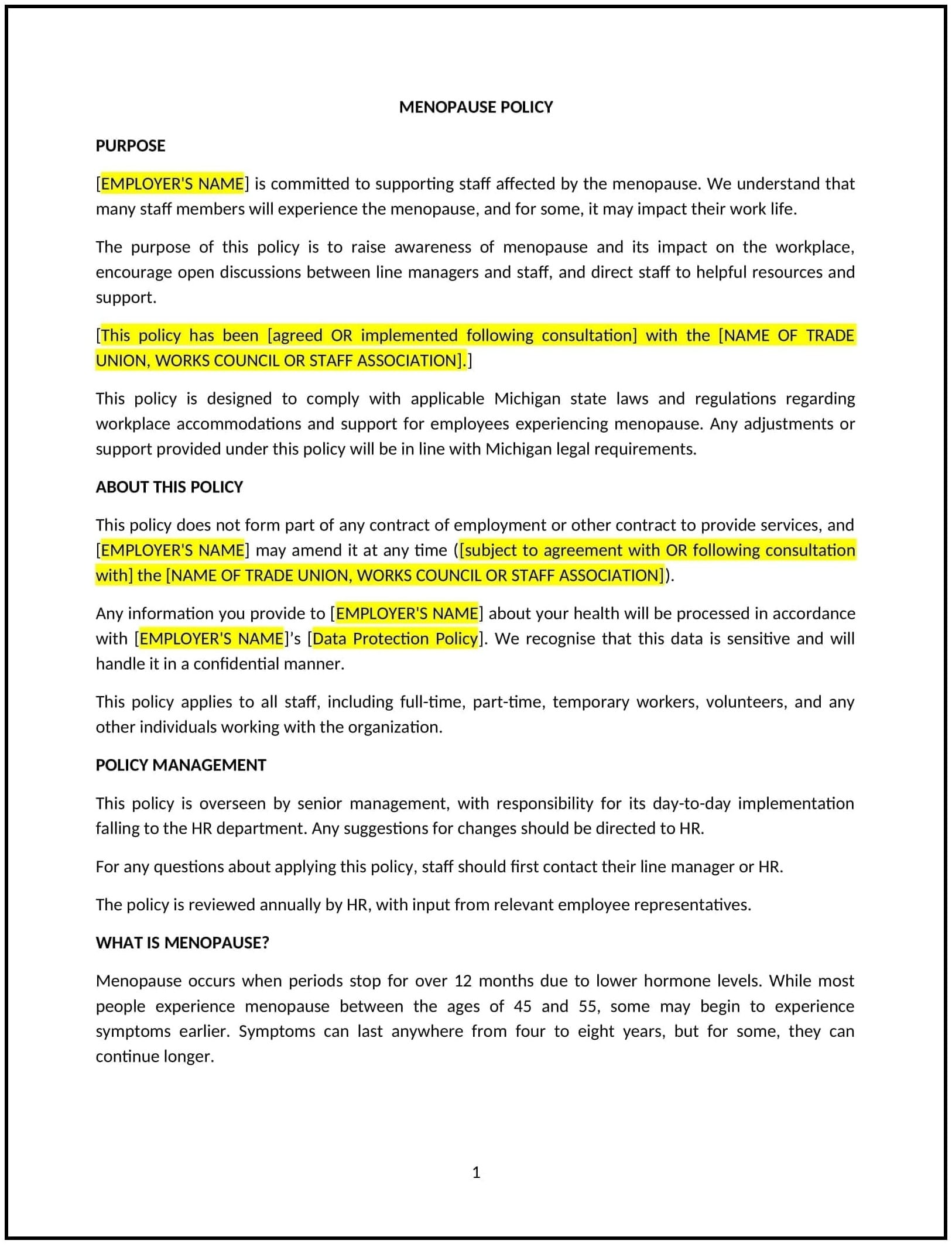Got contracts to review? While you're here for policies, let Cobrief make contract review effortless—start your free review now.

Customize this template for free
Menopause policy (Michigan)
A menopause policy provides Michigan businesses with guidelines on supporting employees who are experiencing menopause-related symptoms. This policy outlines how businesses can accommodate employees during this natural life stage, ensuring a supportive and respectful work environment. It addresses the physical and emotional challenges associated with menopause and aims to minimize any negative impact on an employee's performance and well-being.
By adopting this policy, businesses can demonstrate their commitment to diversity, inclusivity, and employee well-being, while ensuring a positive work environment for individuals going through menopause.
How to use this menopause policy (Michigan)
- Define menopause and related symptoms: Clearly define what menopause is and the common symptoms employees may experience, such as hot flashes, sleep disturbances, mood changes, and cognitive difficulties. This ensures that both employees and managers understand the condition.
- Address workplace accommodations: Outline reasonable workplace accommodations for employees experiencing menopause symptoms, such as providing flexible work hours, access to cooling equipment, or adjusting workplace temperature settings.
- Provide support for affected employees: Ensure that employees feel comfortable discussing their symptoms and requesting support or accommodations without fear of discrimination or stigma. Provide resources, such as an employee assistance program (EAP) or counseling services, to help employees manage their symptoms.
- Ensure privacy and confidentiality: Emphasize that menopause-related discussions should be treated confidentially, and any accommodations requested must respect the employee's privacy.
- Train managers and HR personnel: Offer training to managers and HR staff to raise awareness of menopause and its impact on employees, ensuring they are equipped to provide appropriate support and accommodations.
- Address work-related performance concerns: Ensure that performance issues related to menopause symptoms are addressed with sensitivity and understanding, providing employees with the support they need to maintain their performance levels.
- Encourage open communication: Foster an environment where employees feel comfortable discussing menopause symptoms and potential accommodations with HR or management without fear of judgment.
- Review and update the policy: Periodically review and update the policy to ensure it reflects current best practices, legal requirements, and feedback from employees regarding menopause-related support in the workplace.
Benefits of using this menopause policy (Michigan)
This policy provides several key benefits for Michigan businesses:
- Promotes inclusivity and diversity: The policy supports gender diversity by recognizing the needs of employees experiencing menopause and fostering an inclusive workplace where all employees feel valued.
- Reduces stigma and discrimination: By openly addressing menopause and offering accommodations, businesses can reduce stigma and ensure that employees feel supported and respected during this life stage.
- Improves employee well-being: Providing support and accommodations helps employees manage menopause symptoms more effectively, leading to improved health, well-being, and job satisfaction.
- Enhances employee retention: Supporting employees through menopause-related challenges can improve loyalty and retention, as employees feel their needs are understood and met by the business.
- Complies with legal requirements: The policy ensures compliance with Michigan state laws related to workplace equality and accommodations for employees with health-related conditions.
- Increases productivity and morale: By supporting employees with menopause-related symptoms, businesses can maintain productivity and morale, as employees will be better able to manage their symptoms and continue performing at their best.
Tips for using this menopause policy (Michigan)
- Communicate the policy clearly: Ensure all employees are aware of the menopause policy by including it in the employee handbook, during onboarding, and in regular communications about health and wellness resources.
- Provide manager training: Offer training for managers to help them understand menopause and its potential impact on employees. Managers should be equipped to handle requests for accommodations sensitively and confidentially.
- Foster open dialogue: Encourage employees to communicate openly about their needs related to menopause symptoms. Employees should feel comfortable requesting accommodations or seeking support without fear of stigma.
- Monitor the effectiveness of accommodations: Periodically check with employees who have requested accommodations to ensure that the measures put in place are effective and continue to meet their needs.
- Review the policy regularly: Regularly review the policy to ensure it remains up to date with emerging best practices, feedback from employees, and any changes in Michigan laws regarding workplace accommodations.